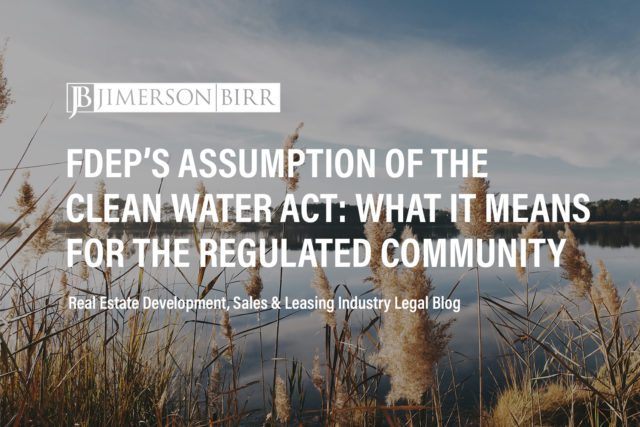What does mitigation banking entail?
Mitigation banking is a market-based mechanism that enables developers to offset their environmental impacts by purchasing credits from a mitigation bank. In Florida, these banks are privately or publicly owned lands that have been preserved, enhanced, restored, or created to provide compensatory mitigation for authorized impacts to aquatic resources, such as wetlands and streams. Mitigation banks generate credits by conserving or restoring these resources per state and federal regulations.
One example of mitigation banking in Florida involves successfully restoring the Panther Island Mitigation Bank in the Everglades. This project, established under the guidance of the U.S. Army Corps of Engineers and the South Florida Water Management District, restored over 2,800 acres of wetlands and uplands, generating valuable credits for developers. Another example is the St. Johns River Water Management District’s Lake Apopka Wetlands Mitigation Bank, which focuses on improving water quality and habitat within the Lake Apopka Basin.
These mitigation banks operate under the guidance of the Clean Water Act (CWA) and the state of Florida’s rules and regulations, ensuring that they provide measurable and lasting ecological benefits. Overall, mitigation banking offers an innovative solution for balancing development needs with conserving valuable natural resources.
Need help regarding environmental due diligence, permitting, mitigation, or compliance? Schedule your consultation today with a top environmental law attorney.
In Florida, which laws and regulations apply to mitigation banking?
Federal and state laws regulate mitigation banking in Florida. On the federal level, the primary statute governing mitigation banking is Section 404 of the Clean Water Act. This law authorizes the U.S. Army Corps of Engineers to issue permits to discharge dredged or fill material into waters of the United States, including wetlands. To offset the impacts of these activities, the Corps often requires developers to purchase credits from approved mitigation banks.
The Florida Department of Environmental Protection (DEP) and the state’s five Water Management Districts regulate mitigation banking at the state level. The DEP’s rules for mitigation banks are in Chapter 62-342 of the Florida Administrative Code, which outlines the requirements for establishing, operating, and managing mitigation banks within the state. Additionally, each Water Management District has its own rules and regulations governing the use of mitigation banking within its jurisdiction.
These federal and state laws ensure that mitigation banks provide effective compensatory mitigation for impacts on Florida’s aquatic resources while fostering sustainable development and conserving the state’s natural resources.
What are common issues regarding mitigation banking that lead to litigation?
The following issues are among the most common in actions regarding mitigation banking in environmental law matters:
- Bank establishment and approval: Disputes may arise over whether a mitigation bank meets the regulatory requirements for establishment and approval, including the necessary permits and agreements with state and federal agencies.
- Credit calculation and pricing: Litigation may result from disagreements over the calculation of mitigation credits generated by a bank or disputes regarding the pricing of those credits.
- Performance standards and monitoring: Conflicts can occur when parties disagree on whether a mitigation bank has met its performance standards or if there are concerns about the adequacy of monitoring and reporting practices.
- Compliance with permit conditions: Lawsuits may occur if a party believes a mitigation bank has not complied with its permit requirements, such as failing to adequately restore or maintain the bank site’s resources.
- Transfer of credits: Disputes can arise over the transfer of mitigation credits, mainly if there are questions about the credits’ validity or appropriateness to offset a specific development impact.
When a set of facts is appropriate for legal intervention, there are many paths a claimant may take. We are value-based attorneys at Jimerson Birr, which means we look at each action with our clients from the point of view of costs and benefits while reducing liability. Then, based on our client’s objectives, we chart a path to seek appropriate remedies.
To determine whether your unique situation may necessitate litigation, please contact our office to set up your initial consultation.
What claims about mitigation banking do plaintiffs generally bring to court, and what are common legal defenses to those claims?
Common claims that real estate developers and businesses face related to mitigation banking include:
- Failure to adequately compensate for environmental impacts
- Non-compliance with federal and state regulations
- Breach of a contract or other agreements
- Negligence in the operation or management of a mitigation bank
Common legal defenses real estate developers and businesses raise against claims related to mitigation banking include:
- Compliance with regulatory requirements: A defendant may argue that they have met all applicable federal and state regulations, including permit conditions and performance standards.
- Good faith efforts: A defendant may assert that they made reasonable efforts to comply with the requirements of a mitigation banking agreement or permit, even if the outcome was unsuccessful.
- Statutory or regulatory defenses: A defendant may rely on specific statutory or regulatory provisions that provide a defense or limitation on liability in certain circumstances, such as demonstrating that they acted per an approved mitigation plan.
- Laches, estoppel, or waiver: A defendant may argue that the plaintiff’s claims are barred due to the passage of time or other equitable considerations, such as the plaintiff’s failure to assert their rights promptly or acquiescence in the defendant’s conduct.
Please contact our office to set up your initial consultation to see what actions or defenses may be available for your unique situation.
Have more questions about an environmental law-related situation?
Crucially, this overview of mitigation banking does not begin to cover all the laws implicated by this issue or the factors that may compel the application of such laws. Every case is unique, and the laws can produce different outcomes depending on the individual circumstances.
Jimerson Birr attorneys guide our clients to help make informed decisions while ensuring their rights are respected and protected. Our lawyers are highly trained and experienced in the nuances of the law, so they can accurately interpret statutes and case law and holistically prepare individuals or companies for their legal endeavors. Through this intense personal investment and advocacy, our lawyers will help resolve the issue’s complicated legal problems efficiently and effectively.
Having a Jimerson Birr attorney on your side means securing a team of seasoned, multi-dimensional, cross-functional legal professionals. Whether it is a transaction, an operational issue, a regulatory challenge, or a contested legal predicament that may require court intervention, we remain tireless advocates at every step. Being a value-added law firm means putting the client at the forefront of everything we do. We use our experience to help our clients navigate even the most complex problems and come out the other side triumphant.
If you want to understand your case, the merits of your claim or defense, potential monetary awards, or the amount of exposure you face, you should speak with a qualified Jimerson Birr lawyer. Our experienced team of attorneys is here to help. Call Jimerson Birr at (904) 389-0050 or use the contact form to schedule a consultation.

We live by our 7 Superior Service Commitments
- Conferring Client-Defined Value
- Efficient and Cost-Effective
- Accessibility
- Delivering an Experience While Delivering Results
- Meaningful and Enduring Partnership
- Exceptional Communication Based Upon Listening
- Accountability to Goals











